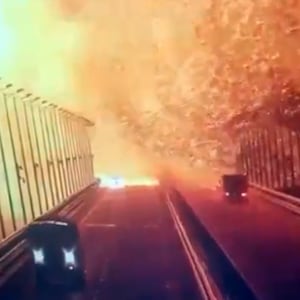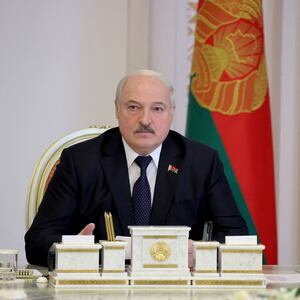Russia escalated its reign of terror against its neighbor this week, raining missiles on the people of Ukraine and civilian infrastructure in what appeared to be a series of indiscriminate strikes. While the attacks seemed to be devoid of any military meaning—changing nothing on the battlefield, where Russia continues to lose—the rationale behind them was revealed on Russian state media, where the ugly truth is systematically breaking through state-erected barriers.
An explosion that rocked the Crimean bridge last week was an attack against one of the symbols of “Russia’s pride,” said State Duma Defense Committee's head Andrey Kartapolov during the latest broadcast of Sunday Evening With Vladimir Solovyov. According to Kartapolov, another such symbol was the sunken warship Moskva—and now, the only symbol that remains is Russian President Vladimir Putin. Kartapolov urged Russians to unite behind Putin, and his desperate plea spotlighted the true reason behind Moscow’s barrage of missiles: to curb waning public support for Putin’s mindless war.
Aggravated by the excitement in Kyiv that followed the explosion of the Crimean bridge last week, Konstantin Dolgov, the former Russian commissioner for human rights, said during Monday’s broadcast of state tv show 60 Minutes that the retaliatory strikes were justified, and that all of Ukraine’s infrastructure should be considered military targets that are fair game for destruction. Dolgov yearned for pained reactions from Ukrainians affected by the strikes, asking: "Are they whining yet? Are they howling yet?"
Appearing on 60 Minutes, member of Russia’s State Duma Andrey Isayev noted that the strikes served as a mood booster for Russian audiences: “It’s absolutely clear that the citizens support the decisive actions of the president and the mood of many has improved.”
Anton Krasovsky, director of broadcasting for the state-funded RT channel, said that he was beyond happy and posted a video of himself dancing on his balcony in his pajamas on Telegram, while the strikes were taking place on Monday.
Konstantin Zatulin, first deputy chairman of the committee of the State Duma for the CIS and relations with Russian nationals abroad, said that seeing the aftermath of Russia’s missile strikes against Ukraine brought a “feeling of satisfaction.” He stated that Russia’s short-term goal is “to reclaim the initiative we used to have, which was unfortunately depleted during the summer, which resulted in considerable losses of the territories we previously controlled.”
Political scientist Sergey Mikheyev argued that the destruction of Ukraine’s civilian infrastructure should have been the priority from the get-go. He opined that the best way Russia can exhibit compassion in Ukraine would be best compared to cutting a dog’s tail off: the faster, the better. Mikheyev advocated leaving all of Ukraine without gas, electricity, running water or sewers. He explained that unless Ukrainians are forced to freeze, they won’t understand what a war truly is. Mikheyev added, “Five to ten million of them should head to Europe.” The same view was previously voiced last week, when Andrey Sidorov, Deputy Dean of world politics at the Moscow State University, urged Russia to cause a massive refugee crisis in Europe, exacerbating economic and political tensions by prompting a massive influx of Ukrainian refugees.
Solovyov wholeheartedly agreed that the Ukrainian infrastructure should be demolished with a constant barrage of missile strikes: “They already consider us villains anyway. It’s better to be feared than to be laughed at.” Sidorov concurred and said that the latest strikes were important for “psychological reasons” and should continue.
Mikheyev stressed that propaganda was a far more effective weapon than HIMARS. He argued that Russia “legitimized” the Ukrainian government and described the President of Ukraine Volodymyr Zelensky as a “roach,” who was turned by Russia into a figure of global stature. Excitedly talking over each other, Mikheyev and Solovyov asserted that Zelensky and the rest of the Ukrainian government should be considered top military targets for the Russian military. Mikheyev added: “Symbolic strikes are very important—we live in the information age.”
Karen Shakhnazarov said he was disturbed by the escalation that he described as a potential Armageddon, but immediately tried to excuse Putin’s strikes against Ukrainian civilians by comparing the Crimean bridge incident to the September 11 attacks in the U.S.
“It is a terrorist action. More than that, in its magnitude, it’s comparable to September 11th in the United States. For Russia, the Crimean bridge is of an even larger importance. The skyscrapers are symbols, but they had no importance to the infrastructure,” Shakhnazarov said. “The Crimean bridge is of enormous importance in linking Crimea to Russia... The United States immediately declared those whom they believed responsible for the destruction of those towers to be outside the law.”








